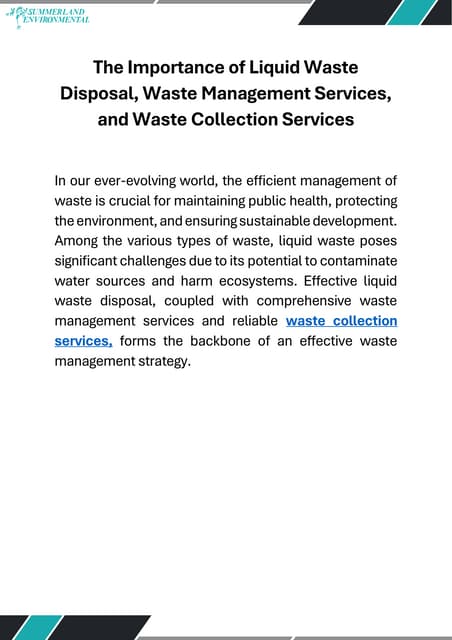Things about Reclaim Waste
Things about Reclaim Waste
Blog Article
6 Easy Facts About Reclaim Waste Explained
Table of ContentsAn Unbiased View of Reclaim WasteIndicators on Reclaim Waste You Need To KnowReclaim Waste - An OverviewReclaim Waste - TruthsThe 15-Second Trick For Reclaim Waste
Domestic sewage waste refers to the waste and items from a domestic septic tank. The correct management and disposal of residential sewage waste need fluid waste to be transferred to a sewer therapy plant where the appropriate approaches and devices are used to detoxify and dispose of waste.
Industrial waste often consists of possible dangers, such as flammable materials or a blend of liquid and strong waste items, and needs an advanced and thorough disposal process. The disposal of industrial waste generally includes the filtration of waste before transport to make certain safe and appropriate disposal. Industrial waste is produced from by-products and overflow of industrial processes and production.
This type of waste can not use the exact same sewer monitoring transportation or processes as septic or industrial liquids. The commercial waste monitoring procedure needs the examination and screening of fluid waste before it goes through the disposal procedure (liquid waste removal melbourne). Runoff waste is the liquid waste that originates from overflow and excess stormwater in very booming locations or cities
Runoff waste can cause contamination and flooding if not dealt with effectively. Discover more concerning drain cleansing and waste monitoring. Making certain proper waste management can prevent calamities and lower ecological damage. Both people in household setups and experts in business or production industries can take advantage of comprehending the processes and regulations of fluid waste management.
The 4-Minute Rule for Reclaim Waste
Contact PROS Providers today to discover our waste administration and disposal services and the appropriate means to look after the liquid waste you generate.
(https://www.awwwards.com/reclaimwaste1/)Do you recognize what takes place to your water when you disengage, flush the toilet or drain pipes the washing device? No? Well, it's worth understanding. This so-called 'wastewater' is not just an essential resource yet, after therapy, will certainly be launched to our land, waterways or the ocean. Made use of water from bathrooms, showers, baths, kitchen area sinks, laundries and commercial processes is called wastewater.

water used to cool equipment or tidy plant and devices). Stormwater, a kind of wastewater, is runoff that moves from agricultural and metropolitan areas such as roofs, parks, gardens, roads, courses and rain gutters right into stormwater drains pipes, after rainfall. Stormwater streams unattended straight to local creeks or rivers, at some point reaching the ocean.
10 Simple Techniques For Reclaim Waste
In Queensland, a lot of wastewater is dealt with at sewer therapy plants. Wastewater is transferred from residential or industrial websites through a system of drains and pump terminals, recognized as sewage reticulation, to a sewage therapy plant.
The Department of Natural Resources recommends neighborhood governments about managing, operating and keeping sewerage systems and therapy plants. In unsewered locations, city governments might call for homeowners to install individual or house sewage treatment systems to deal with domestic wastewater from bathrooms, cooking areas, shower rooms and washings. The Department of Natural Resources authorises the use of household systems when they are proven to be effective.
Most stormwater obtains no treatment. In some new neighborhoods, therapy of some stormwater to eliminate trash, sand and gravel has started using gross pollutant catches. Wastewater treatment takes place in 4 stages: Gets rid of solid issue. Larger solids, such as plastics and various other things incorrectly released to drains, are gotten rid of when wastewater is gone through screens.
Wastewater then moves into huge tanks where solids resolve and are removed as sludge. Oil and residue are skimmed from the surface area. Makes use of tiny living microorganisms referred to as micro-organisms to break down and eliminate remaining dissolved wastes and fine fragments. Micro-organisms and wastes are incorporated in the sludge. Gets rid of nitrogen and phosphorus nutrients that could create algal blossoms in our rivers and intimidate aquatic life.
The Best Strategy To Use For Reclaim Waste
Nutrient elimination is not offered at all sewage therapy plants due to the fact that it needs costly specialist devices. Clear liquid effluent produced after treatment might still consist of disease-causing micro-organisms - industrial wastewater treatment.

This generally suggests wastewater needs to be dealt with or pollutants eliminated prior to it can be discharged to waterways. The majority of wastewater moves into the sewage system. Under the Act, regional governments carry out authorizations and permits for ecologically relevant tasks (Ages) involving wastewater launches that may have a neighborhood impact. The division provides approvals and licences to Periods including wastewater launches that may have a local or statewide effect.
Reclaim Waste - Questions
Otherwise, samples are taken for lab evaluation. Typically lots of examinations are needed to establish the degrees of each of the different toxins such as oils, hefty steels and chemicals in water. Tracking supplies valid info concerning water quality and can validate that licence conditions are being satisfied. The info gotten via monitoring supplies the basis for making water top quality choices.
Report this page